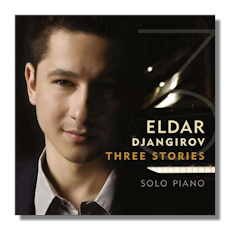
The Internet's Premier Classical Music Source
Related Links
-
J.S. Bach Reviews
Gershwin Reviews
Scriabin Reviews - Latest Reviews
- More Reviews
-
By Composer
-
Collections
DVD & Blu-ray
Books
Concert Reviews
Articles/Interviews
Software
Audio
Search Amazon
Recommended Links
Site News
 CD Review
CD Review
Eldar Djangirov

Three Stories
- Sammy Cahn: I Should Care
- Johann Sebastian Bach:
- Prelude in C# Major
- Air on a G String
- Jimmy Van Heusen: Darn That Dream
- Chick Corea: Windows
- Alexander Scriabin: Etude Op. 2 #1
- Thelonious Monk: In Walked Bud
- Eldar Djangirov:
- Three Stories
- Russian Lullaby
- Impromptu
- Dave Matthews/Stephen Harris: So Damn Lucky
- George Gershwin:
- Embraceable You
- Rhapsody in Blue
- Charlie Parker: Donna Lee
Eldar Djangirov, piano
Sony Masterworks Jazz 785433-2
Eldar Djangirov is a jazz pianist and composer who crosses over into the world of classical music here with his versions of several famous pieces. You may well suspect it's "his version" of the Scriabin Etude, Op. 2, #1, even before you play it when you notice its timing of 5:49 and recall that a typical performance of the pieces lasts about three minutes. Djangirov elaborates on the material and certain Scriabin mavens will regard his rendition as sacrilege. Many will argue, however, that Liszt did as much in his fantasies and paraphrases of famous operatic and ballet music, and few people object to those numerous efforts. Actually, Djangirov's take on Scriabin is reasonably well crafted.
His Bach Prelude in C# Major (taken from the Well-Tempered Clavier, BWV 848) goes at lightning speed and doesn't lead into the Fugue, but continues on in a breathless takeoff of the Prelude's material. Djangirov's technique here is astounding, but again some listeners will not be pleased with his treatment of Bach, with its breakneck speeds and occasional jazzy touches.
The Gershwin Rhapsody in Blue is also Djangirov's version of this classic early jazz piece, but you get more of Gershwin here than you get of Bach in the Prelude track. Djangirov adds some interesting cadenzas in the Gershwin: try the one beginning around 7:30 to hear some truly colorful and inventive writing – or is this pure improvisation? He also manages quite well to effectively capture some of the band/orchestral sonorities of the original.
I'm not familiar enough with most of the other works to say how Djangirov's renditions might differ from the originals, but I would surmise that he takes liberties with them as well. That said, jazz is clearly in his blood and his interpretations of the music are fully convincing.
His own works, Three Stories, Russian Lullaby and Impromptu are quite worthwhile pieces. The first of them, the album's title work, is dominated by a three-note motif heard at the outset, and the music is by turns playful, wistful and fantasy-like. Near the end one catches vague snatches of Berg and Prokofiev in a somewhat percussive episode. Russian Lullaby may be Russian in mood but not in sound. True, it divulges a slightly Scriabinesque character, but it's more cosmopolitan than ethnic and will strike most listeners as a bluesy sort of sad piece that exudes frustration, as suggested in one angry outburst near the end. The Impromptu, though livelier and brighter in mood, also conveys a wistful character. Djangirov's three pieces are, on the whole, more rewarding than those of the other contemporary composers here. This is his sixth album, and although it's my first encounter with his work, I can say there will likely be lots more coming from him, because he is a major talent. The sound is vivid, though the piano has a somewhat spongy bass.
Copyright © 2011, Robert Cummings.




















